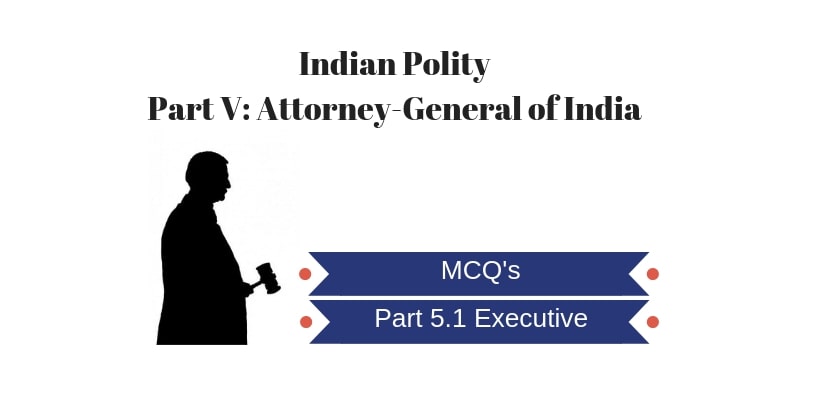Indian Polity: Part-V Attorney General of India MCQ’s
Article 76 Provides for an Attorney General of India. Attorney General is Indian government’s chief legal advisor and its primary lawyer in the Supreme Court of India.
Qualification of Attorney General:
- Citizen of India.
- Minimum five years service as a Judge of a High Court or 10 years an advocate of a High Court
A distinguished jurist in the opinion of the president.
Appointment and Term of the Attorney General:
- The Attorney General is appointed by the President.
- He must be a person who is qualified to be appointed a judge of the Supreme Court.
That means, he must be a citizen of India and he must have been a judge of any High Court for five years or an advocate of some High Court for ten years or an eminent jurist, in the opinion of the President. - The term of office of the attorney general is not fixed by the Constitution. Also, the Constitution does not contain the procedure and grounds for his removal.
- He holds office during the pleasure of the President. Thus, he may be removed by the President at any time.
- He may also quit his office by submitting his resignation to the President.
- Conventionally, he resigns when the government (Council of Ministers) resigns or is replaced. This is because he is appointed on the government’s advice.
Solicitor General of India :
- Apart from the Attorney General, there are other law officers of the Government of India.They are the solicitor general of India and additional solicitor general of India.
- They assist the attorney general in the fulfillment of his official responsibilities.
- Article 76 does not mention about the solicitor general and additional solicitor general.
- The attorney general is not a member of the central cabinet. There is a separate law minister in the central cabinet to look after legal matters at the government level.
Part V – Attorney General MCQ’s
1. According to the table of Precedence published by the Union Government, the Attorney-General for India occupies the _____ place.
A. tenth
B. eleventh
C. sixth
D. ninth
[toggle] Answer – B [/toggle]
2. The Attorney General of India has the right of audience in
A The Supreme Court
B Any High Court
C Any Sessions Court
D Any Court of Law within India
[toggle] Answer – D[/toggle]
3. Which of the following article of the Indian Constitution dealt with the appointment of attorney general of India?
A. Article 72
B. Article 74
C. Article 76
D. Article 68
[toggle] Answer – C[/toggle]
4. Which of the following is true about the Attorney General of India?
A. He has the right of audience in all the courts in India
B. His term of the office and remuneration is decided by the president
C. He advised the Government of India
D. All the above
[toggle] Answer – D[/toggle]
5. Who is the highest legal officer of the Union Government of India?
A. Attorney General of India
B. CAG
C. President
D. Solicitor General of India
[toggle] Answer – A [/toggle]
6. To be eligible for appointment as Attorney General of India, a person must possess the qualifications prescribed for a_______:
A. Judge of Supreme Court of India
B. Judge of a high court
C. A renown lawyer
D. Solicitor General of India
[toggle] Answer – A [/toggle]
7. Which one is not true about the Attorney General of India?
A. He is the legal advisor to the Government of India
B. His tenure and salary is decided by the President
C. He has the voting right in the proceeding of the Parliament
D. He appears before high courts and Supreme Court in cases involving union government.
[toggle] Answer – D [/toggle]
8. Which of the following describes India as a secular state
A. Fundamental rights
B. Directive principles of state policy
C. Fifth schedule
D. Preamble of the Constitution
[toggle] Answer – D[/toggle]
9. Consider the following statements.
1) The Attorney General of India is the Indian Government’s Chief legal advisor.
2) The salary of the Attorney General is fixed by the Parliament.
3) The Attorney General is appointed by the President of India under Article 76.
Select the correct statements:
A. 1 only
B. 1, 2 only
C. 2 & 3 only
D. 1 & 3 only
[toggle] Answer – D[/toggle]
10. Consider the following statements:
1 Attorney general must be a person qualified to be appointed as a judge of the Supreme Court.
2 In the discharge of his duties, the Attorney General is assisted by four solicitor general.
Which of the above statements is/are correct?
A. Only 1
B. Only 2
C. Both 1 and 2
D. Neither 1 nor 2
[toggle] Answer – A [/toggle]

